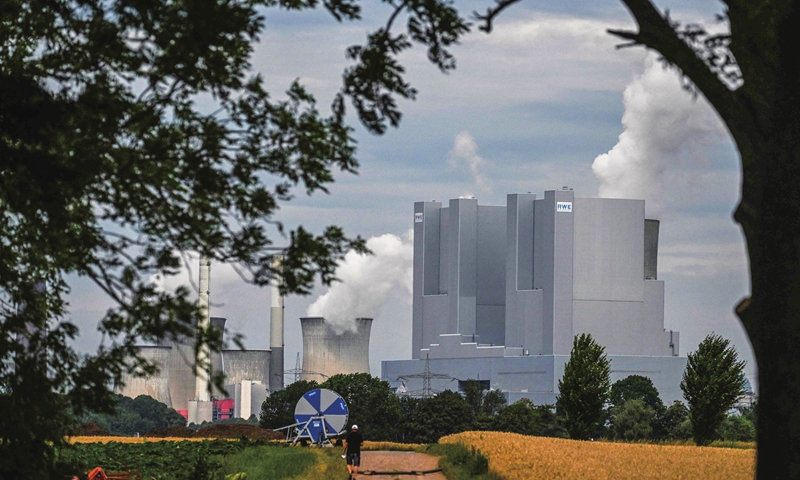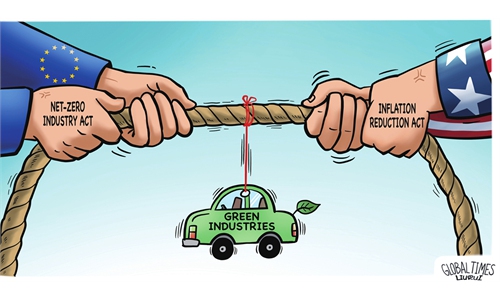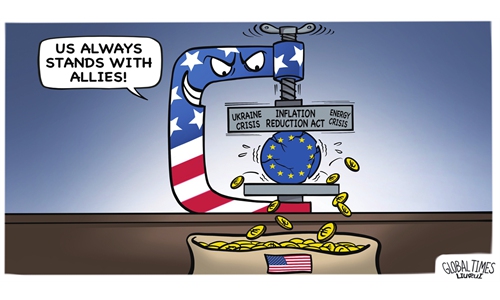
A coal-fired power plant operated by German energy supplier RWE is seen in Neurath, western Germany, on July 13, 2022. In response to a squeeze of Russian gas supplies, Germany has reactivated mothballed coal power plants to take the burden off gas. Photo: cnsphoto
Brussels is posed to push back against the US' huge subsidies for green technologies as France and Germany's economic ministers reportedly started talks with US officials on Tuesday to ask Washington not to poach business from European companies.
Experts said more divergences between them will pop up given the US' adherence to the "America First" agenda and the profound implications of the Russia-Ukraine conflict on the Europe, while urging the EU to strengthen engagement with China to forestall declining European economy.
French Economy Minister Bruno Le Maire and German Economy Minister Robert Habeck kicked off talks with White House officials on Tuesday, expressing the EU's concerns about US President Joe Biden's landmark climate legislation and the IRA, the Financial Times reported. Le Maire and Habeck will ask the US not to go beyond that framework by luring more EU businesses to America, according to the report.
Habeck said in a statement before his trip that there is a need for "friendly, fair competition." While Le Maire called the IRA "a game changer," noting that it "offers competitive advantages which, coupled with very low energy prices in the United States, poses a risk to our industries," AFP reported.
The visits came after French President Emmanuel Macron's state visit to the US in December 2022 during which he confronted Biden over the IRA, reflecting escalating trade row between the allies across the Atlantic.
The American law, which contains hundreds of billions of dollars in subsidies for green tech, aims to bolster investment in everything from electric carmakers to renewable energy producers. It has sparked widespread fears in Europe as a growing number of businesses considering investments in Europe would pivot to the US, attracted by the subsidies and low energy costs.
Experts blasted the US for seeking its own benefits at the expense of its allies, which would create sweeping harm to Europe as it threatens to induce long-term recession and "de-industrialization" in the continent.
"The profound reason is global energy crunch caused by the Russia-Ukraine conflict instigated and prolonged by the US in the first place. The EU has become the biggest victim of the conflict, threatening the bloc's industrial security, especially in semiconductors and automobiles," Li Yong, deputy chairman of the Expert Committee of the China Association of International Trade, told the Global Times on Tuesday.
Li said there seems to be limited solutions despite the EU's strong push-backs. "The US sticks to the notorious 'America First' policy rather than taking care of its European allies' interests in launching the IRA," he said.
Take the automobile industry for example. Zhao Junjie, a research fellow at the Chinese Academy of Social Sciences' Institute of European Studies, told the Global Times that about eight million people are employed in Europe in the long industry chain of automobiles, and thus is closely related to the interests of every EU member's private sector, workers and overall economic recovery.
"It's a problem of chain of the events," he said.
Despite the US' initiative to strengthen industrial and supply chain cooperation to contain China and Russia, more divergences between the US and the EU would emerge in the future, as France is pushing EU to embrace "strategic autonomy," Zhao said.
Experts have urged the EU not to follow the US policies but strengthen cooperation with China to continue their sound economic partnership to accelerate the EU's economic recovery in the post-coronavirus era.



